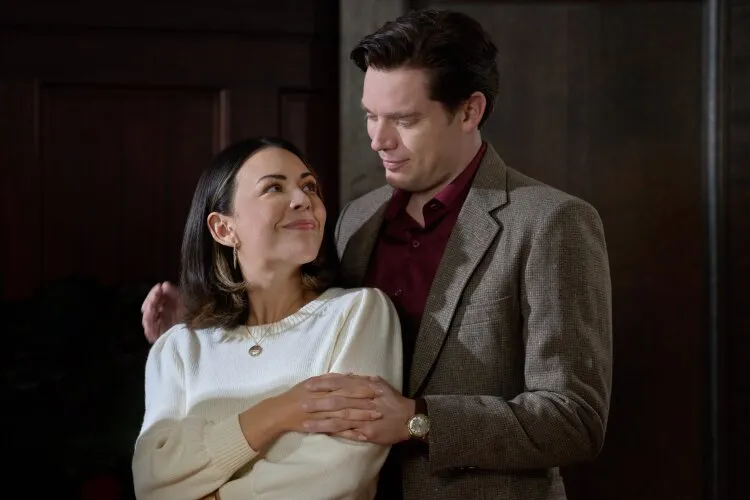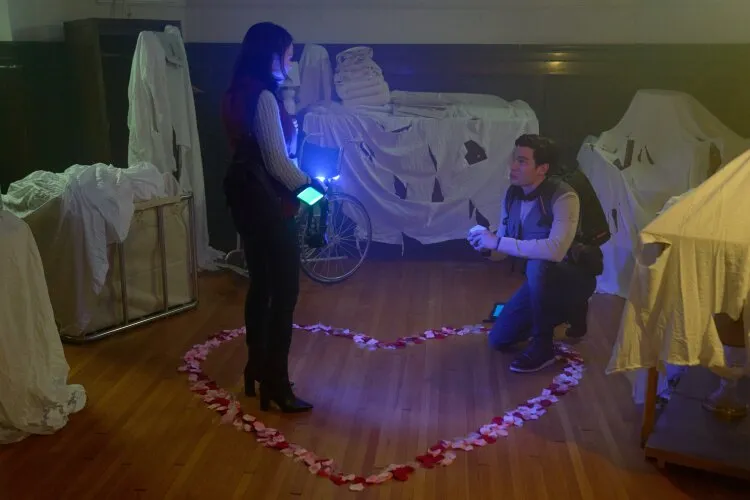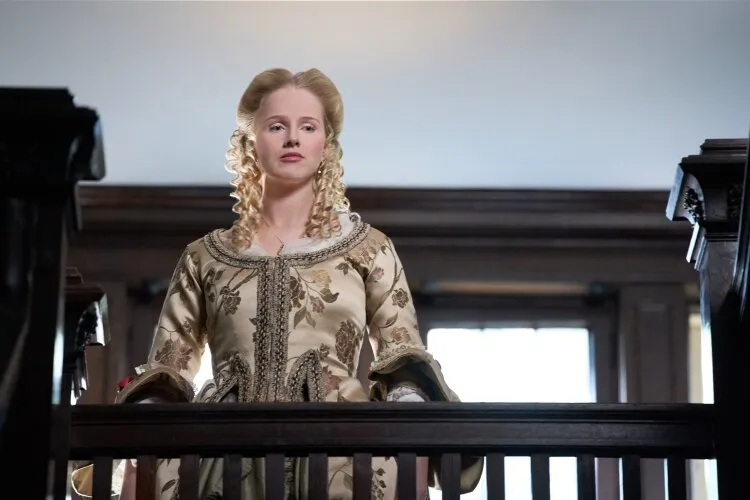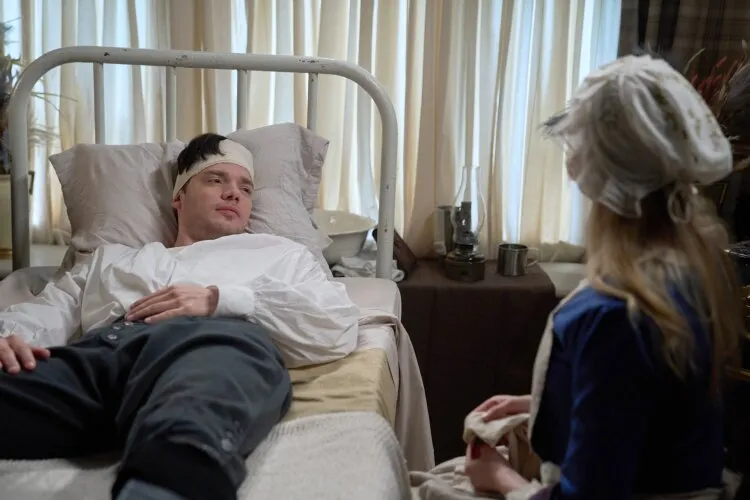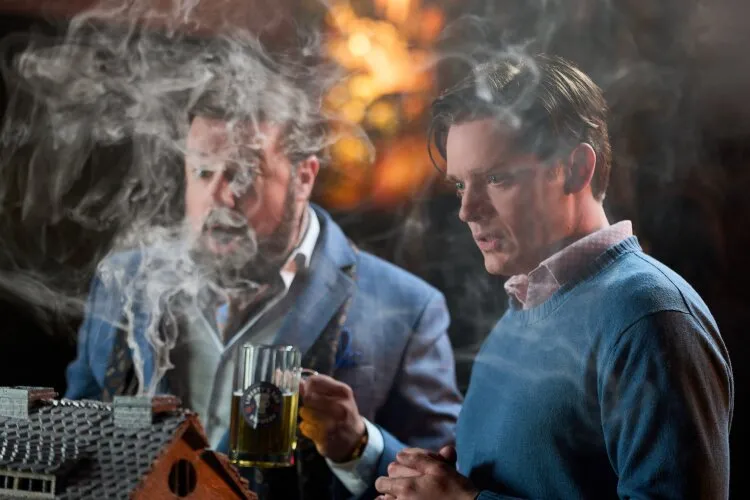The haunted inn Keystone Manor, which serves as the setting for “Haunted Wedding,” is like a character in and of itself, full of supernatural charm and history. We meet Brian and Jana here. They are excited about their wedding plans and very interested in ghost hunts. Their strange adventures raise an interesting question: are they ready for the ghosts waiting for them?
Angelique appears as a ghostly person with a sad love story from the 18th century. Her unsettled feelings reflect the larger problem of how to end relationships in society. In the same way that Angelique’s unfinished business could stop the couple’s wedding, our unfinished feelings can get in our lives. The creaky floors of the manor house represent the emotional baggage we carry, and the ghosts represent the traumatic events that keep us from being happy.
Much like a ghost, does love linger long after it’s gone? This interplay between the supernatural and emotional depth invites us to reflect.
A Study in Contrasts: The Characters of Haunted Wedding
Jana and Brian, the main characters in “Haunted Wedding,” are an interesting mix of modernity and custom. In the show, Jana is shown to be the more logical and science-minded of the two, while Brian is more spiritual. The “rational-irrational dichotomy” is a microcosm for the film’s larger themes.
Their friendship goes back and forth between lighthearted banter and tense moments, often caused by their different views on the supernatural. Jana is looking for reasonable reasons, but Brian is more interested in the strange, like a kid chasing shadows in a dark room.
But their character arcs show a worrisome lack of consistency. Their fights sometimes seem manufactured, leading to a lack of emotional impact. They seem to be deeply linked one minute and at odds over small things the next. This crazy emotional landscape could reflect a social critique of modern relationships—aren’t we sometimes haunted by our pasts, like Angelique?
Angelique, speaking of her character, gives the narrative more depth. As a ghost with a tragic past, she serves as both a plot driver and a mirror of the unfinished business that plagues many. Malcolm was a hero in the Revolutionary War, and she longs for him. This brings up themes of sacrifice and how love lasts. However, her characterization occasionally crosses the line into melodrama, making her reasons feel less complex and more universal.
Then there’s Earl, the comic relief, whose appearance raises an interesting question: Does humor reduce the emotional weight of the film or enhance it? While intended to provide humor, Earl’s pranks frequently feel like a last-minute addition, as if the writers were unsure whether to embrace the absurdity or maintain a serious tone. As a reminder that laughter can often hide deeper insecurities even in the realm of the supernatural, he personifies the film’s fight to find a cohesive voice.
As we navigate these characters, one must ponder whether they ultimately improve the story or merely float like ghosts in a narrative that isn’t quite finished.
Love Beyond the Grave: Themes and Motifs in Haunted Wedding
At its heart, “Haunted Wedding” is a moving story about love and loss, told through the lives of two people who are also dead. The film perfectly contrasts Jana and Brian’s modern romance with Angelique’s tragic longing for her lost love, Malcolm. This duality makes viewers reflect on how past traumas affect the relationships we have now. If you can’t get past the ghosts of the past, how can you move forward?
Jana’s unresolved feelings from her previous engagement create noticeable tension. This shows that our emotional baggage is just as much a part of us as our happy memories. The film suggests that love, while often praised, can also be a scary force that changes how people see things and makes it harder to start new relationships. In the end, love is like a double-edged sword—it can both heal and trap.
The supernatural aspects of the film heightened this exploration. Ghostly meetings aren’t just plot devices; they help characters grow as well. Jana and Brian have to face their own emotional landscapes because Angelique is haunting them, pushing them to solve their inner problems. The house, which reeks of the past, represents the weight of unresolved histories that can permeate even the happiest events.
Still, one has to wonder: Do these supernatural elements add anything to the narrative, or are they just decoration? The film tries to explore greater existential questions about love and loss, but it sometimes relies on tired plot devices. In doing so, it starts a conversation about how society deals with unsettled feelings and the things lost love leaves behind.
“Haunted Wedding” may not fully explore its themes, but it still makes viewers ponder the complicated dance between love and loss, both in this life and the next.
The Tenuous Balance: Tone and Style in Haunted Wedding
The film’s creators try to strike a delicate balance between serious emotional depth and comedic levity in “Haunted Wedding.” This stylistic interplay frequently feels disjointed, as if the film is unsure whether to be a fun time or a serious look at love and loss.
Mostly, the humor is campy and almost cartoonish, like in family shows from the 1990s (think ghostly antics that might have been on a Nickelodeon special). But just as one settles into the silliness, the narrative switches to more serious moments, which forces an emotional resonance that feels a little forced.
This tone difference greatly affects how people understand what is being said. The sudden changes from absurdity to pathos may be confusing for viewers hoping for the cozy hug of a Hallmark romance. The film seems to be having difficulty deciding what it wants to be, oscillating between the absurdity of ghostly tricks and the serious weight of Angelique’s sad past. In this situation, the interplay of humor and sadness becomes a cacophony rather than a symphony, prompting one to coin the term “tragicomic dissonance.”
“Haunted Wedding” seems to be aimed at a wide range of people. The supernatural elements may be a welcome change from the usual for Hallmark fans, who typically prefer predictable narratives with lots of romance. However, the film’s uneven production could turn off people who like the emotional clarity of typical Hallmark movies. Is it intended for viewers to laugh at the absurdity or to empathize with the ghosts’ suffering? This lack of clarity calls the film’s cultural effect into question: does it change the Hallmark brand or just make things more confusing?
In the end, “Haunted Wedding” challenges viewers to navigate its comedic and serious elements while grappling with the ghosts of their own expectations, provoking thought on the complexities of tone in storytelling.
Ghostly Aesthetics: Cinematic Techniques in Haunted Wedding
The direction and visual style of “Haunted Wedding” try to create a fun but creepy atmosphere, but the results aren’t always consistent. The director, grappling with the film’s tonal dissonance, uses sets that go back and forth between being charming and scary.
With its creaky floors and dark areas, Keystone Manor is a backdrop for romance and supernatural mystery. One could argue, though, that the manor’s potential for being scary is harmed by its overly bright lighting, which takes away from the real creepiness that one would expect from a haunted place. “Is it a haunted house or a cozy B&B?” The line feels hazy.
Much of the visual storytelling is based on tired tropes, like ghostly figures framed by flickering candles and characters nervously peering through dark doorways. Although this method sets the scene well, it risks entering the realm of predictability. The director sometimes chooses superficial aesthetics over deeper involvement with the themes of love and loss, despite the possibility that the juxtaposition of romantic moments against a backdrop of ghost stories could have been rich in symbolism.
When it comes to sound and music, the soundtrack is very important to how the film’s emotional landscape is created. There are funny sound effects that break up the lighter moments and sweeping symphonic scores that make the sadder scenes more powerful. However, the music can sometimes feel overly sentimental and even melodramatic, rather than adding to the narrative. The soundtrack sometimes tries to make you feel things that the story doesn’t support, so one could even coin the term “musical overreach” to describe it.
Ultimately, “Haunted Wedding’s” filmmaking techniques show moments of creativity and promise, but they frequently falter under the weight of the film’s erratic tone. This raises an interesting question: Can a film really work if the sounds and images are at odds with one another?
Ghosts in the Hallmark: A Comparative Analysis of Haunted Wedding
With both adherence to and departures from the network’s tried-and-true routines, “Haunted Wedding” presents an interesting case study within the Hallmark genre. The supernatural is typically absent from Hallmark films, which traditionally focus on predictable tales about love, community, and personal growth.
In this case, though, adding ghostly aspects makes the formula more interesting. However, one could argue that this change, instead of adding something new to the genre, could turn off its main fans. The film’s attempt to combine romance and the supernatural feels like putting on socks that don’t go together.
When comparing “Haunted Wedding” to other Hallmark movies with supernatural themes, such as “The Christmas Spirit” or “Ghosts of Christmas Always,” the latter has a trend toward lightheartedness and humor. With fantastical elements that enhance rather than detract from the main romantic narrative, these films can maintain a consistent film tone. The character of “Haunted Wedding” is in flux, oscillating between comedic ghostly antics and touching moments.
Can the sacred space of Hallmark romance handle the supernatural without losing its essence? This inconsistency might cause viewers to ponder the bigger implications of genre blending. The film teeters on this edge but doesn’t always reach a satisfying ending.
Ghosts of Mixed Reviews: Final Thoughts on Haunted Wedding
The movie “Haunted Wedding” presents an odd mix of charm and chaos, showing many Hallmark movies’ good and bad sides. On the one hand, the supernatural element of the film offers a novel setting for exploring themes of love and loss, inviting viewers to participate in a narrative that attempts to go beyond conventional romantic tropes. The setting of Keystone Manor, with its ghostly residents and historical intrigue, holds promise for a deeper study of unresolved emotions, but it frequently settles for surface-level engagement.
Audiences feel stuck in a ghostly limbo due to the film’s inconsistent tonality, oscillating between silly comedy and serious drama. Character growth, especially between Jana and Brian, feels a bit flat, which lowers the emotional stakes of their relationship journey. The film’s ambition may be admirable, but its execution falls short, leading some to argue that the film’s moments feel more like missed chances than heartfelt revelations.
As for suggestions, “Haunted Wedding” might appeal to viewers seeking a strange holiday film—perfect for viewers who enjoy a little supernatural in their holiday romance, though there are some things to keep in mind, fans of Hallmark’s more traditional shows might find themselves perplexed and unsure whether to laugh or empathize with the characters.
This film offers an odd combination that could either become a cult favorite or blend into the background like a ghostly whisper in a world full of predictable storylines. Ultimately, it makes viewers ponder: can love overcome everything, even their emotional ghosts?
The Review
Haunted Wedding
With its romance and supernatural mixture, "Haunted Wedding" attempts to give the Hallmark formula new life. The film does a great job setting goals but often falls short because of its inconsistent tone and weak characters. There are times when the comedic and emotional moments clash, leaving viewers confused. Those seeking a strange holiday film might enjoy it despite its flaws. Ultimately, it raises interesting questions about love and loss but doesn't offer a cohesive experience.
PROS
- Unique blend of romance and supernatural elements
CONS
- Tonal inconsistencies between comedy and drama
- Underdeveloped character arcs
- Predictable plot points and clichés
- May confuse traditional Hallmark fans









































